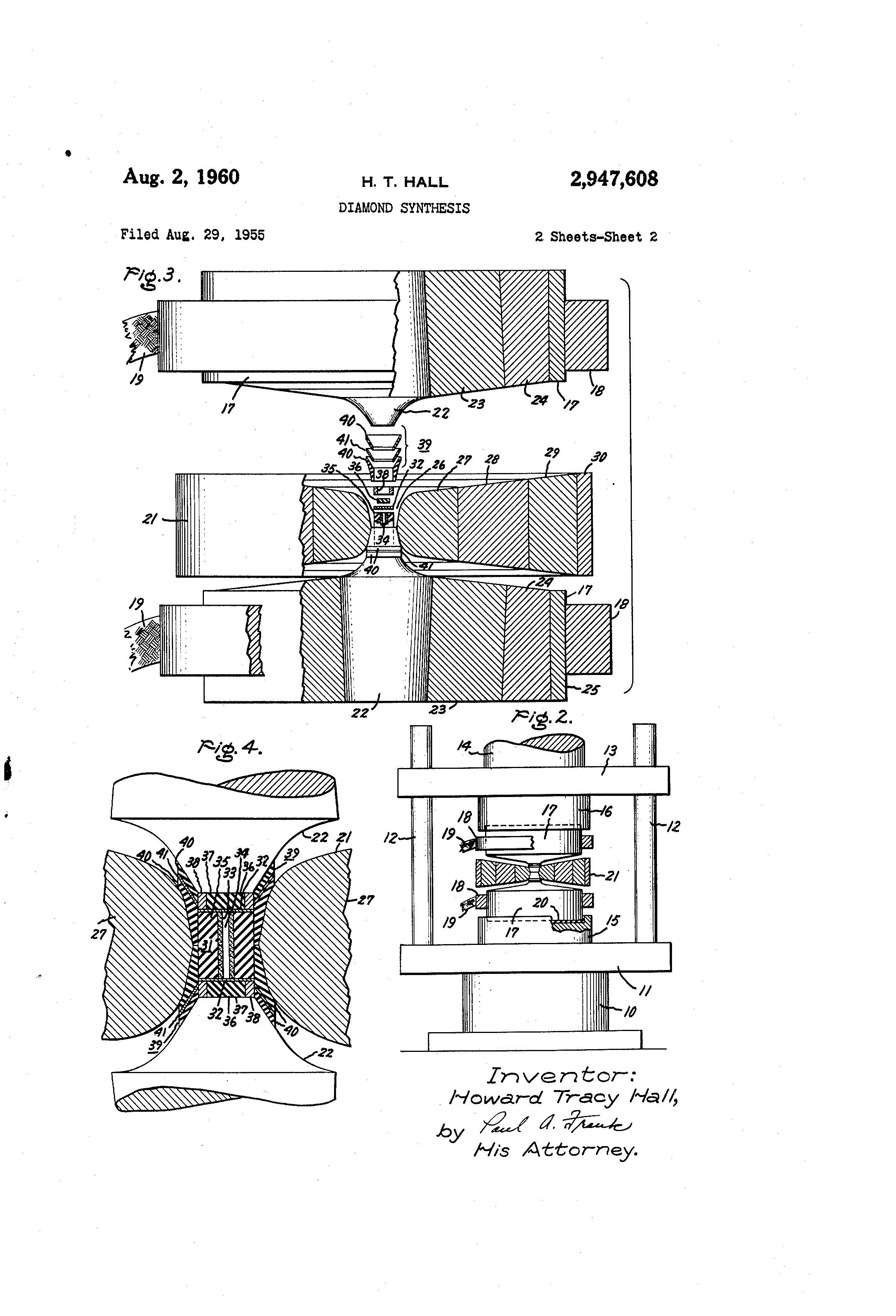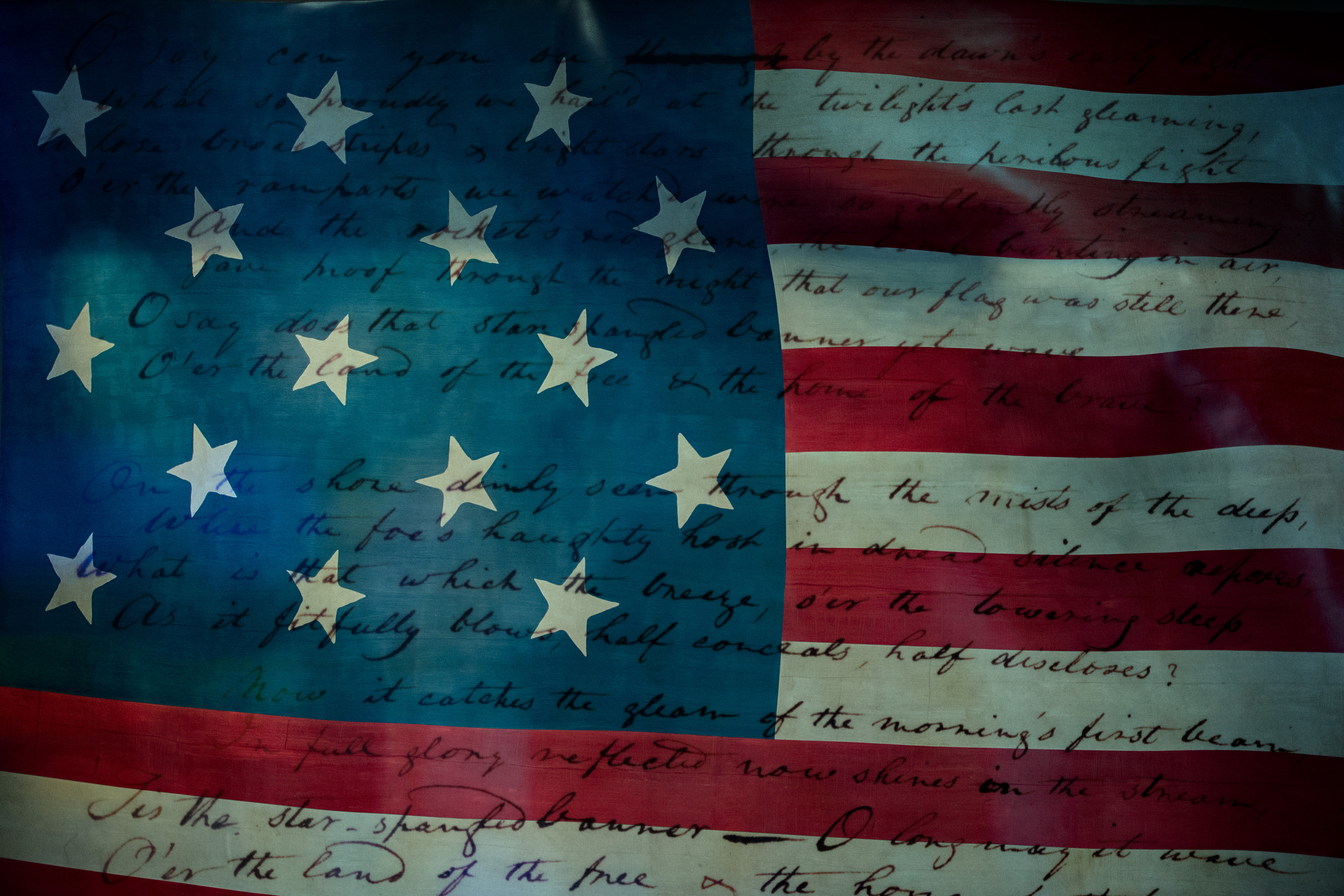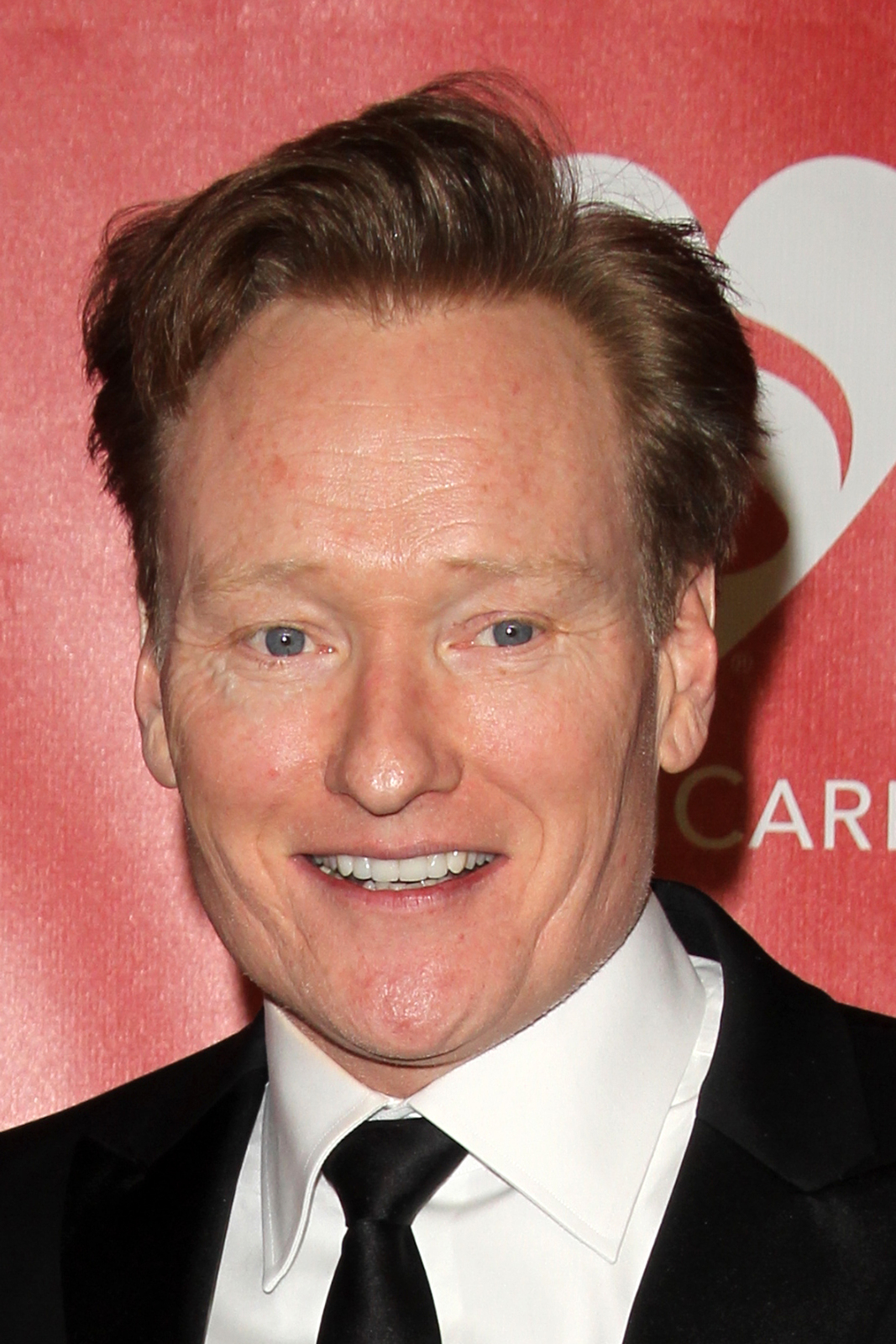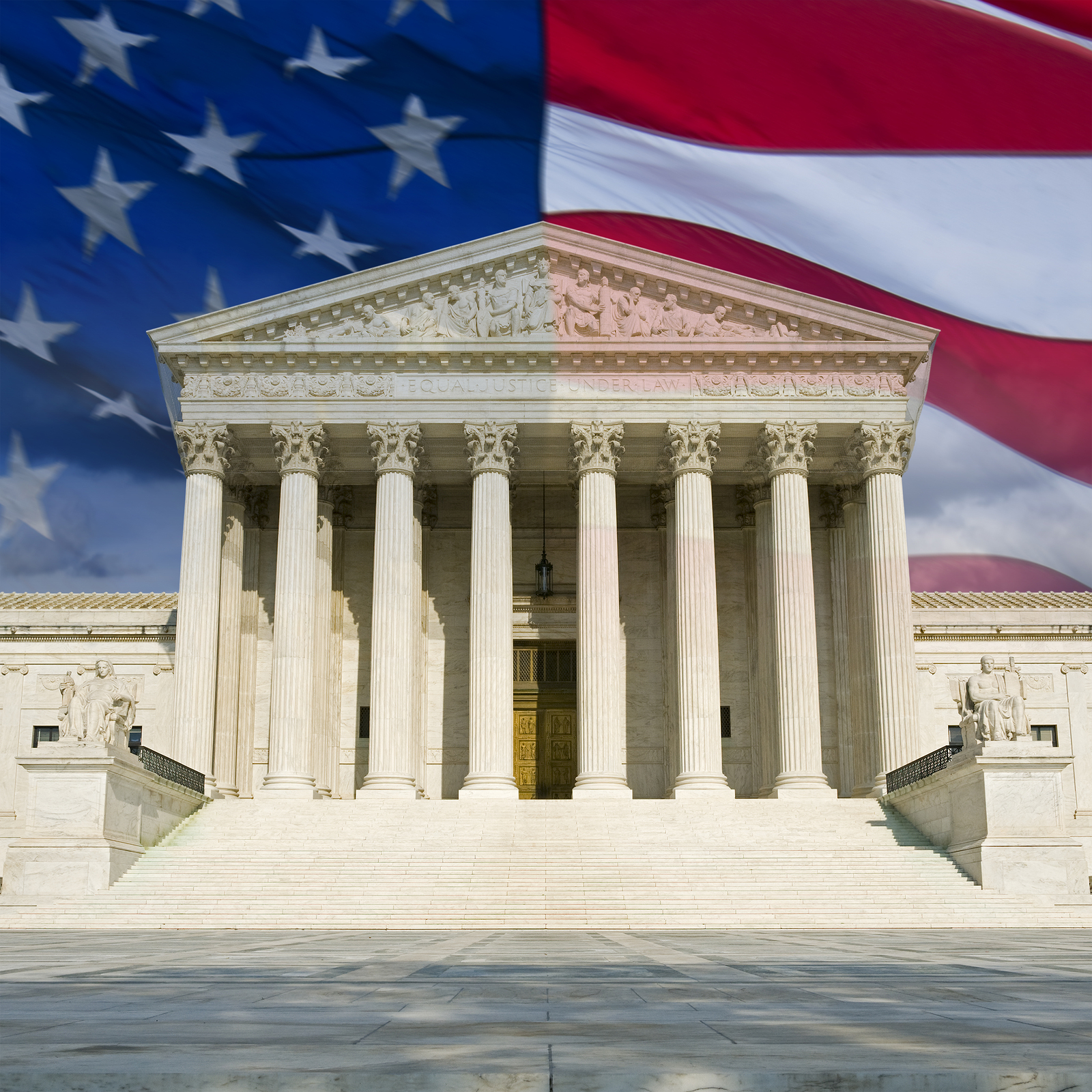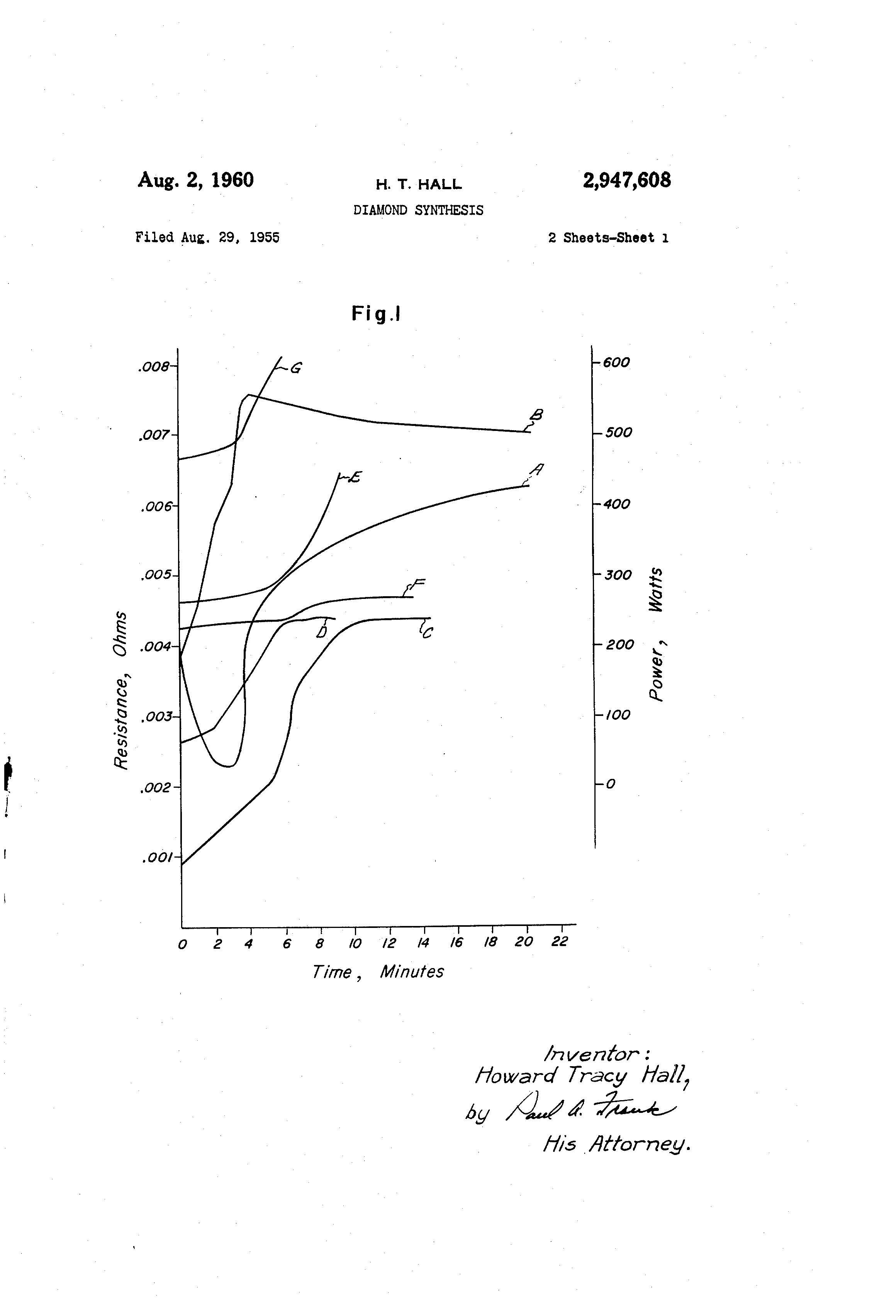Allergan Inks Patent Deal with Saint Regis Mohawk Tribe
Allergan, the multinational pharmaceutical company, has recently come under fire for the sale of some of their patents. The company, best known for the cosmetic treatment, Botox, and the chronic dry eye medication, Restasis, has partnered with the Saint Regis Mohawk Tribe, a sovereign Indian nation that borders New York and Canada. This partnership involved the transfer of six patents that cover the company’s top-selling drug Restasis.
It is not uncommon for large pharmaceutical companies to have multiple patents that cover the formulas and technologies of one drug. Rival companies wait until these patents expire so they can release a “generic” or lower-cost version of the same drug. Alternatively, a competing company may challenge the validity of the patents in court to show the patents should not have been granted in the first place. The venue of choice for instituting a validity challenge is the Patent Trial and Appeal Board (PTAB). The PTAB is an administrative board and is faster and less costly than federal courts. Critics of the PTAB feel it should be eliminated as venue is redundant and invalidity cases should be challenged solely in federal court; an issue the Supreme Court will hear next year (Oil States vs. Greene’s Energy Group).
On September 8, 2017, Allergan transferred six patents to the Saint Regis Mohawk Tribe. The Tribe will license the patents back to Allergan in exchange for continuous payments of up to $15 million annually from the sale of Restasis. In addition to the annual royalties, the Tribe was also given an upfront sum of $13.75 million.
This unprecedented move by Allergan could potentially allow them to avoid Inter Partes Review (IPR) proceedings in the PTAB due to the Saint Regis Mohawk Tribe’s sovereign immunity status. In an interview, Brett Saunders, chief executive of Allergan stated the reason they made this deal was to “really make sure that we can defend these patents in only one forum.” When asked if he opened the gate for others to follow, he said, "[y]eah, there are some folks [in the pharma industry] who may pursue this but they'll also have to find the right partners."
Of course, some feel that the move by Allergan is inappropriate and threatens the pharmaceutical industry. U.S. Senator Sherrod Brown stated this deal “rips off consumers” and cannot “become the new normal.” Richard Torczon, counsel representing Mylan Pharmaceuticals, called the sale of the patents a “sham transaction.”
The Saint Regis Mohawk Tribe is familiar with this process as they currently hold patents for a technology company they would not name. The 13,000-person community has an annual budget of $50 million and in a press-release, the Tribe stated how this money will greatly benefit them.
"This is a viable and sound opportunity for the Saint Regis Mohawk Tribe to enter into the patent, technology, and research sector as part of our overall economic diversification strategy," the statement read. "We realize that we cannot depend solely on casino revenues and, in order for us to be self-reliant, we must enter into diverse business sectors to address the chronically unmet needs of the Akwesasne community; such as housing, employment, education, healthcare, cultural, and language preservation."
It is worth noting that if Allergan loses in federal court the deal between Allergan and the Saint Regis Mohawk Tribe comes with an important catch; it may become null and void if Allergan loses the current federal case regarding Restasis. The six aforementioned patents will expire in 2024.
Suiter Swantz IP is a full-service intellectual property law firm, based in Omaha, NE, serving all of Nebraska, Iowa and South Dakota. If you have any intellectual property questions or need assistance with any patent, trademark, or copyright matters and would like to speak to one of our patent attorneys please contact us.
Patent of the Day: Combined Swing and Chair
Suiter Swantz IP takes a look back at past inventions and inventors with our Patent of the Day.
On this day in 1903, Charles W. Rote was granted U.S. Patent No. 737,276 for a COMBINED SWING AND CHAIR.
A portion of the patent states:
The object of the present invention is to provide a combined swing and lawn-chair adapted to be suspended from a ceiling-or other suitable support to operate as a swing and capable of being placed upon a stand whereby it is converted into a lawn-chair.
A further object of the invention is to provide a device of this character in which the back, seat, and drop sections or frames will be pivotally connected and freely movable when arranged either to form a swing or a lawn-seat to enable the occupant to sit in an upright position or to recline without leaving the device to adjust the parts.
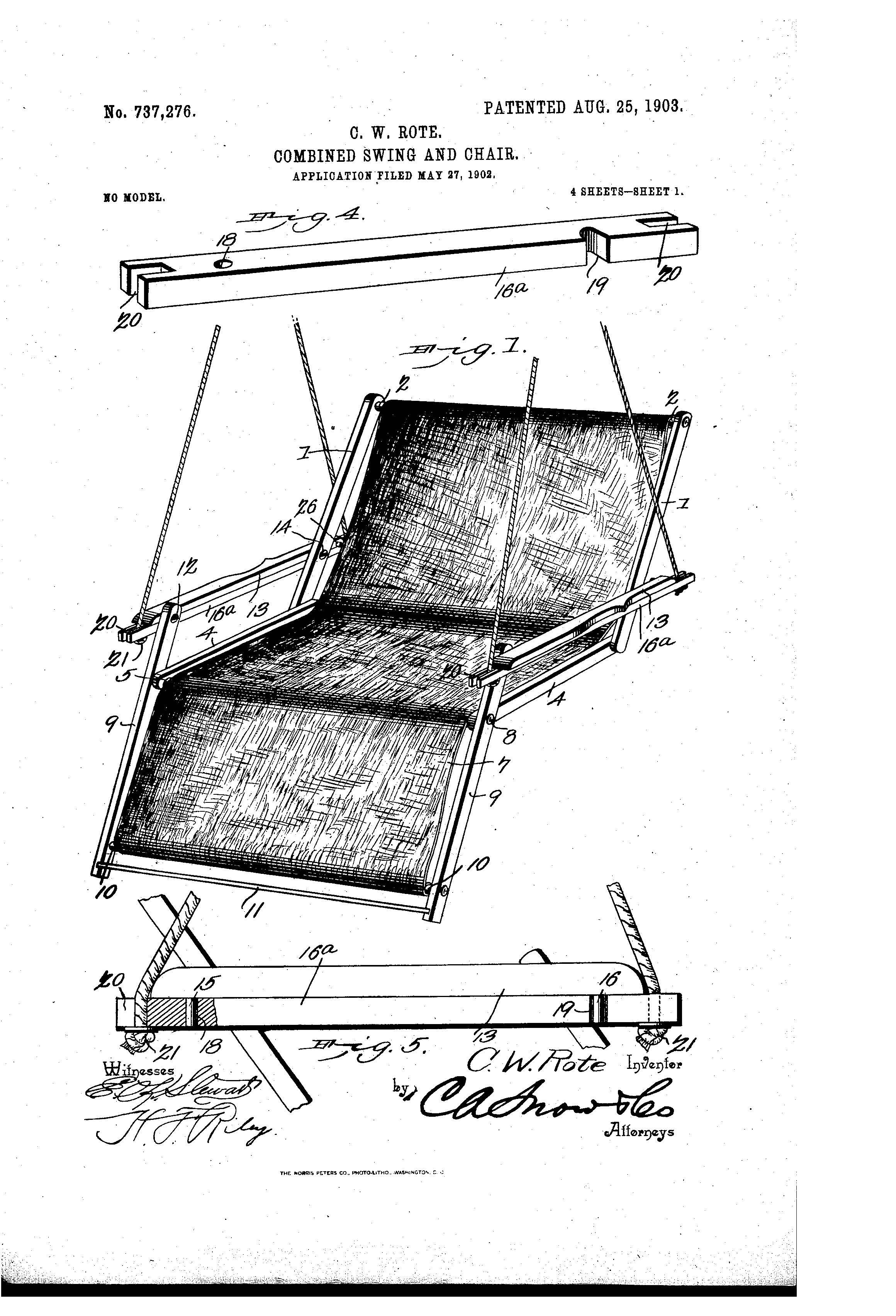

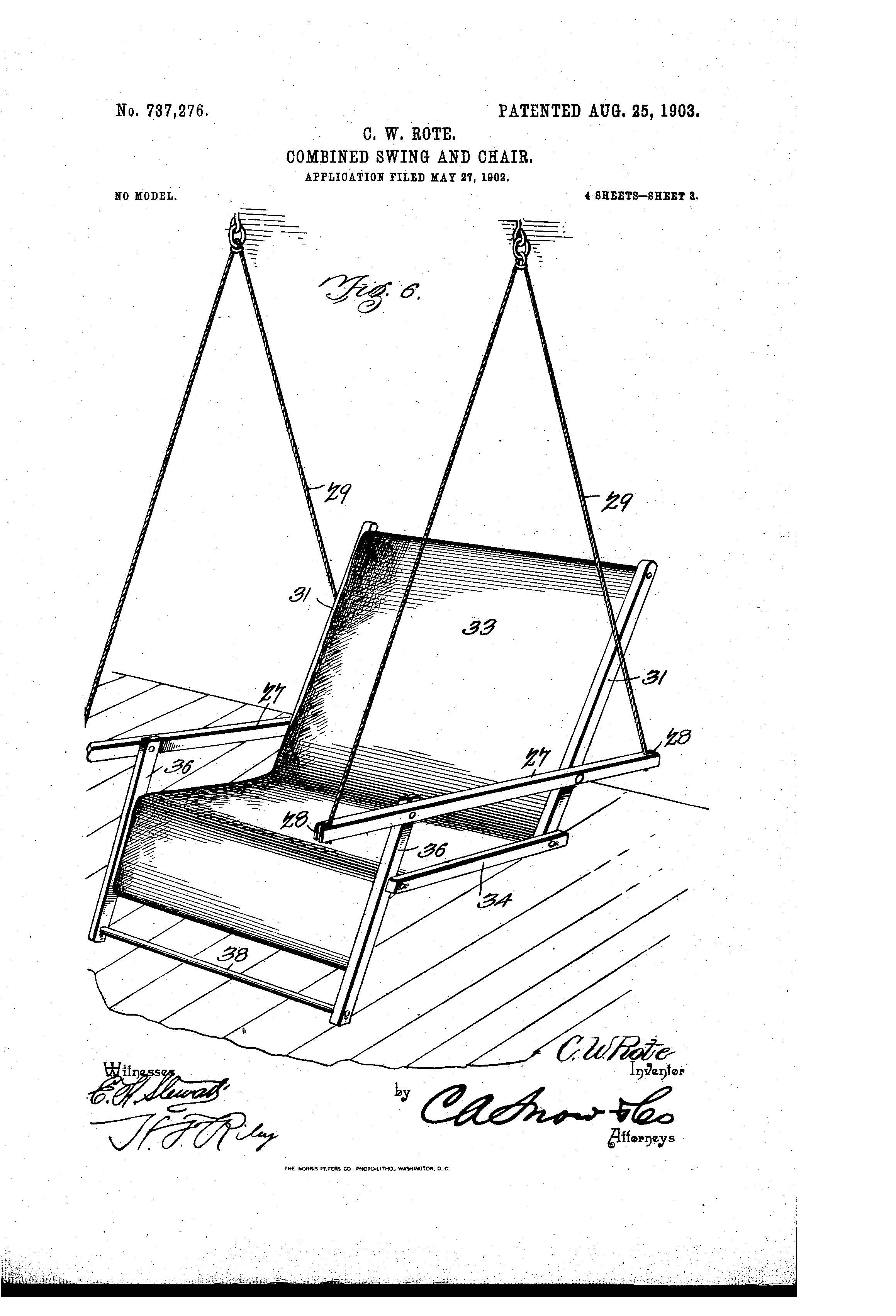
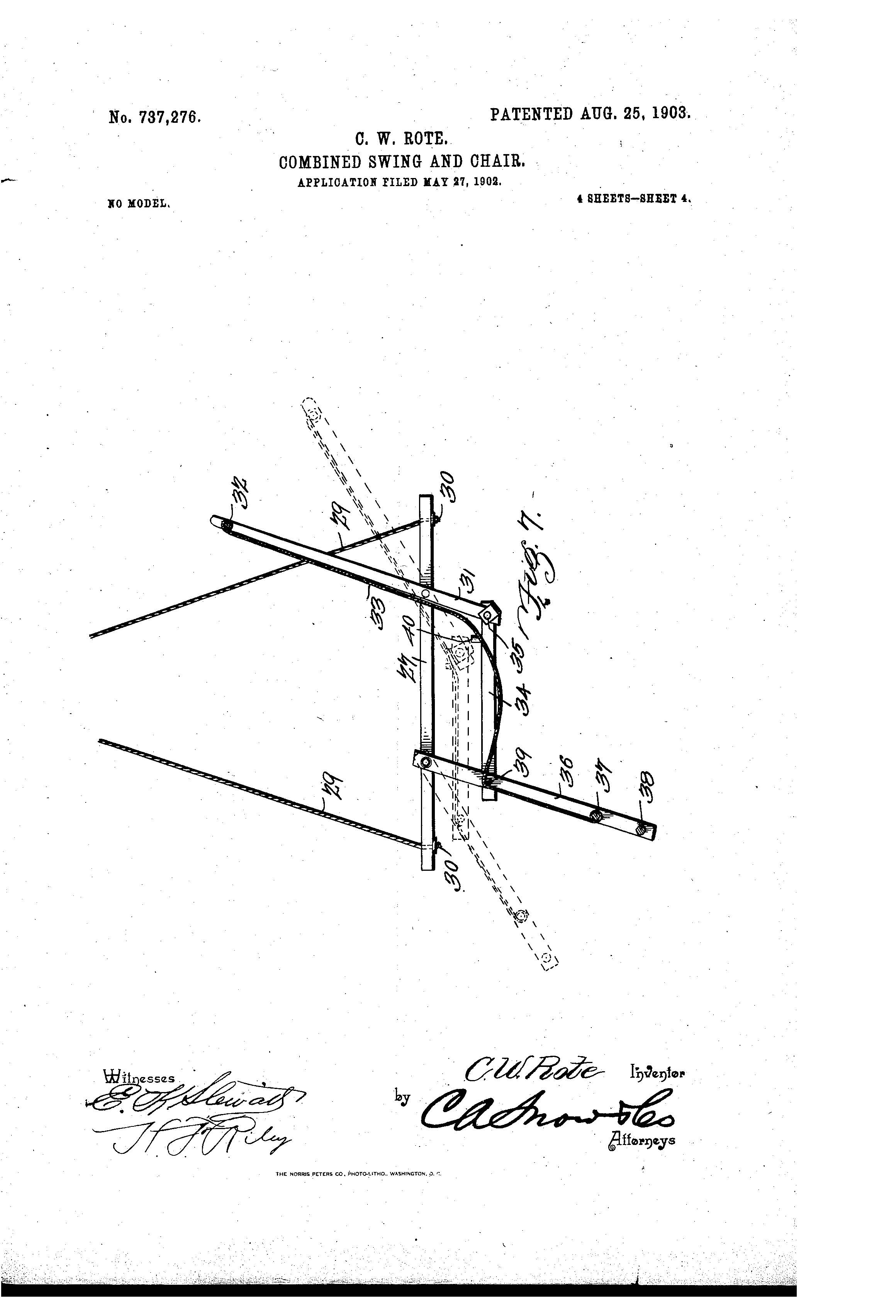
Suiter Swantz IP is a full-service intellectual property law firm, based in Omaha, NE, serving all of Nebraska, Iowa and South Dakota. If you have any intellectual property questions or need assistance with any patent, trademark, or copyright matters and would like to speak to one of our patent attorneys please contact us.
Patent of the Day: Domino
Suiter Swantz IP takes a look back at past inventions and inventors with our Patent of the Day.
On this day in 1884, Joseph E. Crosby was granted U.S. Patent No. 303,816 for a DOMINO.
An expert from the patent states:
This invention relates to dominos such as are comprised in game apparatus; and its object is to provide a simple and improved domino adapted to be more firmly grasped and held by the player and lifted with facility and convenience, whereby slipping and falling of the domino from the fingers and displacement of the other dominos in use in the game is entirely obviated.
To this end my invention consists, substantially, in providing the rectangular sides of the domino with one or more sharp edges projecting over the side.
Suiter Swantz IP is a full-service intellectual property law firm, based in Omaha, NE, serving all of Nebraska, Iowa and South Dakota. If you have any intellectual property questions or need assistance with any patent, trademark or copyright matters and would like to speak to one of our patent attorneys please feel free to contact us.
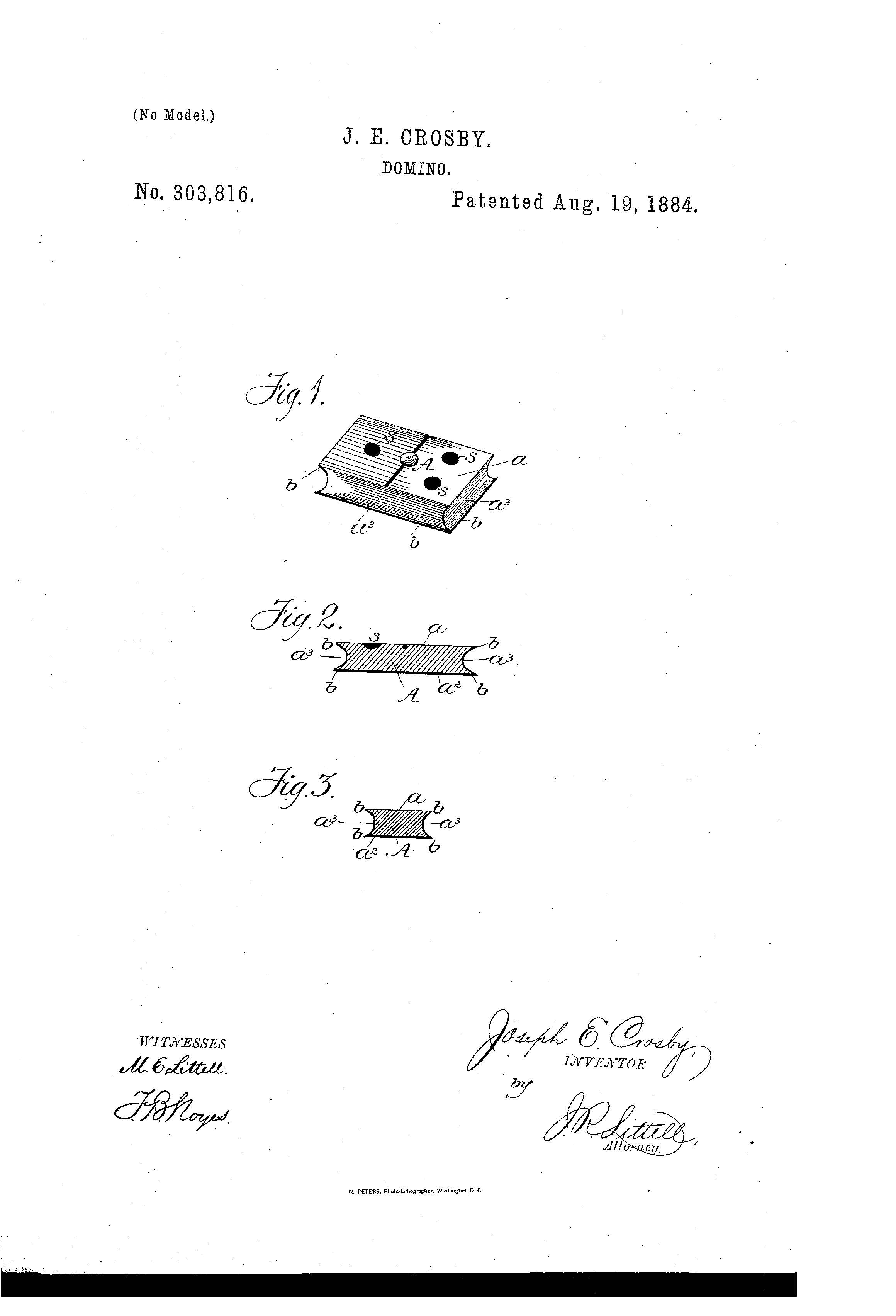
Who Owns the Copyright to the National Anthem?
Francis Scott Key penned America’s national anthem, “The Star-Spangled Banner”. The song, originally a poem, titled “The Defence of Fort McHenry” was written after Key witnessed the British bombard the Maryland fort during the War of 1812. Key was moved and inspired at the sight of the lone U.S. flag flying high over Fort McHenry amidst the rubble and destruction. This scene was reflected in the words of the now famous anthem: “[a]nd the rockets’ red glare, the bombs bursting in air, gave proof through the night that our flag was still there.”
The poem was later set to the music of a popular drinking tune by composer John Stafford Smith called “To Anacreon in Heaven”. The song became very popular after the Civil War with patriotism at a high. People started referring to the tune as the “Star Spangled Banner”. In 1916, President Woodrow Wilson declared that the song should be played at all official events. On March 31, 1931, Congress declared the “Star-Spangled Banner” as the national anthem of the United States of America.
As we hear the anthem sung at events around the country and the world, some often wonder, who owns the rights to the “Star Spangled Banner”?
The answer to that can be complicated. Since the song was declared the national anthem of the United States, the copyright became public domain to all U.S. citizens and enterprises. However, mechanical, publishing, and performance rights may still apply.
Mechanical rights are the rights obtained from a creator or publisher to record and distribute their works or rights held by the person or persons whose performance was recorded (i.e. vocalist, instrumental, comedian, etc.). Once the song is published it can be recorded by anyone as long as a fee is paid and a mechanical license is obtained.
Publishing rights are intellectual property rights to the sound recording that can be bought or sold to parties that may or may not have any involvement with the recording. The owner of these rights has the control of where and how the recording is obtained or broadcast. These rights are not defined by a statute, rather it is a term recognized in the music industry.
Performing rights are a copyright owner's exclusive right to control the public presentation or a work, either live, through broadcast, or in moving image or sound recordings. This is part of copyright law and payment is required to the composer, lyricist, and publisher, if one was used.
To put this all together, for example, when the National Anthem is sung, broadcast, or recorded during a televised National Football League (NFL) game, the NFL owns the mechanical, performance, and publishing rights for that specific performance. The same rules apply to anthems sung by other organizations such as Major League Baseball (MLB), National Basketball Association (NBA), etc.
Fortunately, for those who enjoy singing in the shower or displaying their vocal talents on YouTube, feel free to sing the National Anthem loudly and proudly!
Suiter Swantz IP is a full-service intellectual property law firm based in Omaha, NE, serving all of Nebraska, Iowa, and South Dakota. If you have any intellectual property questions or need assistance with any patent, trademark, or copyright matters and would like to speak to one of our patent attorneys please feel free to contact us.
Taco Tuesday Trademark
There are a lot of monikers for the different days of the week; Manic Monday, Thirsty Thursday, and Sunday Funday®. One popular moniker used on Tuesdays is Taco Tuesday®. Tuesdays are typically a slow night for restaurants and the use of this phrase has helped to get customers in the door.
Unfortunately, unlike tacos, this phrase is not for public consumption. The Cheyenne, Wyoming based franchise, Taco John’s, is the owner of this registered trademarked phrase and the company is not shy about letting people know it. They have sent over 100 cease-and-desist letters demanding companies remove the phrase from their websites, flyers, social media pages etc.
One company, The Old Fashioned in Madison, Wisconsin, learned first-hand how serious Taco John’s is about protecting their trademark. The restaurant had been running a “Taco Tuesday” special for nine years when they received a cease-and-desist letter. "At first we were kind of — not angry, just perplexed," said Jennifer DeBolt, manager of the Old Fashioned. DeBolt and restaurant owners Bob Miller and Tami Lax thought they were part of a joke.
After much deliberation, the owners decided not to pursue a lawsuit as they did not want a long drawn out legal battle and did not feel they would win the case. Instead, the Old Fashioned held a contest for their customers to rename the Tuesday night special with the winner receiving free tacos for a year. The restaurant had over 600 entries with clever names such as “The Tuesday Special That Shall Not Be Named”, “Trademark Tyrant Taco Day!” and “Taco-tastic Tuesday”. They eventually settled on “Ole Tuesday”.
The phrase “Taco Tuesday” was first introduced by the Taco John’s franchise in 1980 by David Olsen, a Taco John’s manager in Minnesota. In an attempt to generate business on a slow night Olsen came up with the idea to sell two tacos for 99 cents, he originally called it “Taco Twosday.” Thanks to the phrase, business increased on Tuesdays and as a result Taco John’s decided to incorporate it in their advertising. Due to the phrase’s popularity, the company thought it would be in their best interest to get a trademark for it. In 1989 Taco John’s was granted U.S. Trademark Registration No. 1572589 for “Taco Tuesday”.
Taco John’s has registered the phrase in 49 of the 50 states but were unable to register the phrase in New Jersey, as restaurateur Greg Gregory already owned the trademark. Gregory’s original idea of “Margarita Thriller Night” was shot down by his parents, the restaurant owners at the time. They compromised and allowed him to sell tacos on Tuesdays, an item not many restaurants were serving at that time. Gregory liked the way Taco Tuesday sounded and from there the phrase stuck. Tuesdays began to build momentum, there was an increase in traffic and orders for tacos. A college professor of Gregory’s came in for tacos one night and told him he should consider trademark protection for the phrase and he did. Gregory was granted the trademark in 1979 (U.S. Trademark Registration No. 3621366) and still uses it today in his restaurant, Gregory's Restaurant and Bar.
Some consider Taco John’s to be bullies when it comes to threatening legal action over the phrase but Chief Marketing Officer Billie Jo Waara would disagree. “Over the years we’ve certainly asserted our trademark against national companies, restaurants big and small, and even pharmaceutical companies. We also recognize that the unauthorized use [of Taco Tuesday] is prolific, and we do our best to communicate ownership. It’s a challenge for sure.” By not protecting the phrase Taco John risks the trademark falling into the public domain and according to Waara “[i]t’s just unfathomable to us not to protect it.”
Next time you are out on a Tuesday for tacos, take note to see if the restaurant is illicitly using the phrase. If anything, you can enlighten your friends on your vast knowledge of the history of “Taco Tuesday” and its trademark.
Suiter Swantz IP is a full-service intellectual property law firm based in Omaha, NE, serving all of Nebraska, Iowa, and South Dakota. If you have any intellectual property questions or need assistance with any patent, trademark, or copyright matters and would like to speak to one of our patent attorneys please feel free to contact us.
Conan O'Brien Sued for Stealing Jokes
What did the comedy writer say to the comedian…? Sounds like the beginning of a good joke; but in this case, the comedy writer is suing the comedian. Robert “Alex” Kaseberg, a blogger and comedy writer, is suing talk show host Conan O’Brien, his production company, Turner Broadcasting System, Time Warner Inc., and the executive producer and head writer of the Conan show for copyright infringement over five two-beat jokes.
Kaseberg, who has been a part of the comedy scene for over 20 years, has written for many publications and has had over 1,000 of his jokes told by former late-night host Jay Leno. In 2014, Kaseberg began to notice similarities between some of the jokes he posted on his Twitter feed and blog page to those Conan O’Brien was telling in his monologues. From December 2014, to June 2015, Kaseberg found five jokes he posted repeated almost verbatim on Conan’s talk show.
The lawsuit was brought to U.S. District Judge Janis L. Sammartino who refused to toss the case and provide summary judgement like Conan and his companies would have preferred. Instead, the judge is moving the case forward towards a jury trial. Sammartino stated, “[a]lthough these jokes are not exactly identical, that is not the test. There is a genuine issue of material fact whether a jury would find these objective similarities to be virtually identical within the context of the entire joke.” When it comes to comedy, copyright protection is thin at best. Facts and ideas do not get copyright protection, only expressive elements of comedy that have been added can be protected. In order for O’Brien’s jokes to infringe Kaseberg’s copyright, the jokes must be “virtually identical,” which is only one step below verbatim.
Of the five two-beat jokes, Sammartino granted summary judgement and dismissed two of the jokes leaving three to move forward. Below are the jokes in question.
Kaseberg: "Tom Brady said he wants to give his MVP truck to the man who won the game for the Patriots. So enjoy that truck, Pete Carroll."
O'Brien: "Tom Brady said he wants to give the truck that he was given as Super Bowl MVP ... to the guy who won the Super Bowl for the Patriots. Which is very nice. I think that’s nice. I do. Yes. So Brady’s giving his truck to Seahawks coach Pete Carroll."
Kaseberg: "The Washington Monument is ten inches shorter than previously thought. You know the winter has been cold when a monument suffers from shrinkage."
O'Brien: "Yesterday surveyors announced that the Washington Monument is 10 inches shorter than what’s been previously recorded. Yeah. Of course, the monument is blaming the shrinkage on the cold weather. Penis joke."
Kaseberg: "Three towns, two in Texas, one in Tennessee, have streets named after Bruce Jenner and now they have to consider changing them to Caitlyn. And one will have to change from a Cul-De-Sac to a Cul-De-Sackless."
O'Brien: "Some cities that have streets named after Bruce Jenner are trying to change the streets’ names to Caitlyn Jenner. If you live on Bruce Jenner cul-de-sac it will now be cul-de-nosack."
In February of 2015, after multiple attempts to contact Conan’s team, Kaseberg successfully got ahold of Mike Sweeney, head writer for the show. Kaseberg noted the call was anything but successful calling it “agonizing”. According to Kaseberg, Sweeney “angrily and loudly” denied any implication that “his writers would have anything to do with [Plaintiff’s] pathetic blog and it’s [sic] author, [Plaintiff], a no-name failure.”
O’Brien’s team released a statement about the lawsuit saying “[w]e are very pleased that the court has granted summary judgment and dismissed two of the jokes at issue. We can’t comment further on pending litigation, but we are extremely confident that once the facts are presented to a jury, we will be fully vindicated."
It is not uncommon in the comedy world to be accused of stealing jokes. In fact, many high-profile comedians pay lesser known comedians for their material. What is uncommon is to have the accusation end in a lawsuit. Most of these accusations are handled out of court, as many comedians do not have the financial resources like talk show hosts do to pursue a court case.
Kaseberg’s attorney, Jayson Lorenzo stated, “[t]his is a victory for comedy writers, especially lesser known writers. Their works are protected, and you can’t use someone else’s material, no matter who you are, without facing liability.”
Suiter Swantz IP is a full-service intellectual property law firm based in Omaha, NE, serving all of Nebraska, Iowa, and South Dakota. If you have any intellectual property questions or need assistance with any patent, trademark, or copyright matters and would like to speak to one of our patent attorneys please feel free to contact us.
Supreme Court Makes Decision on Disparaging Trademarks
Can the government refuse trademark protection for a name that is considered offensive or disparaging? Until recently, the answer to this question was “yes.” However, in a unanimous decision, in Matal v. Tam (formerly Lee v. Tam), the Supreme Court of the United States (SCOTUS) ruled that members of an Asian-American rock band, the Slants, have the right to register their disparaging name for trademark protection. Only eight justices ruled on this case as Justice Neil Gorsuch was not on the Court when the case was argued.
A little over a decade ago, bassist Simon Tam formed a band composed entirely of Asian-Americans and decided to name the band the Slants. His intention behind the name was to put a new spin on the historically derogatory term and make it empowering. While touring, he crossed paths with two other bands with the same name. He decided it was in the band’s best legal interest to trademark the name, as it would establish their brand and provide legal protections against other groups with the same name. The United States Patent and Trademark Office (USPTO) denied the group’s trademark application citing the Lanham Act, which forbid the registration of marks considered “scandalous, immoral, or disparaging.” The Slants case raised questions about government efforts to police names that may be offensive to one group or another.
The United States Court of Appeals for the Federal Circuit (CAFC) ruled in favor of the band and held that failure to register the Slants’ trademark amounted to a violation of the First Amendment. On Monday, the Supreme Court sided with the Slants, striking down a section of the law that called for making assessments about whether the name was derogatory or offensive. “It offends a bedrock First Amendment principle: Speech may not be banned on the ground that it expresses ideas that offend,” Justice Samuel Alito wrote in the unanimous decision.
Alito further wrote that “[t]he disparagement clause violates the First Amendment’s Free Speech Clause. Contrary to the Government’s contention, trademarks are private, not government speech.” Under the Free Speech Clause, the government cannot decide which viewpoints it likes and does not like. Stressing that trademark law is primarily designed to assist consumers in distinguishing between products and to safeguard companies’ investments in their name and brand, the Court regards governmental regulation of free speech as outside the scope of trademark law.
Washington’s pro-football team, the Redskins, have been closely following this case as they have been in danger of losing their trademark protection due to the controversial nature of their team’s name. In 2014, the USPTO concluded that the team could not trademark its name because anything that is “scandalous, immoral, or disparaging” is prohibited from trademark registration. This was further reinforced in 2015 when the federal office and a federal judge for the Eastern District of Virginia said that the team should have its trademark revoked because the name was offensive to Native Americans. The USPTO canceled six of the team’s trademarks after receiving pushback from Native American activists. The team appealed and if the 4th US Circuit Court of Appeals uses the Slants case as a precedent, it seems likely that the team will prevail on appeal.
While the Redskins must wait for the end of their legal battle, the Slants can breathe a sigh of relief and enjoy their victory. "After an excruciating legal battle that has spanned nearly eight years, we’re beyond humbled and thrilled to have won this case at the Supreme Court," the band said in a statement. "This journey has always been much bigger than our band: it’s been about the rights of all marginalized communities to determine what’s best for ourselves."
Patent of the Day: Vehicle Tire
Suiter Swantz IP takes a look back at past inventions and inventors with our Patent of the Day.
On this day in 1911, Francis H. Holton was granted U.S. Patent No. 1,000,000 for a VEHICLE-TIRE.
Be it known that I, Francis H. Holton citizen of the United States, residing at Akron, in the county of Summit and State of Ohio, have invented certain new and useful improvements in Vehicle-Tires, of which the following is a specification.
My invention has reference to an improvement in vehicle tires adapted to take the place of the pneumatic tire now in common use.
To this end the invention consists in a tire which is provided with a specially constructed yielding member or part of a more or less cellular or equivalent formation and adapted to provide substantially the same kind and measure of resiliency that is obtained by the pneumatic tube and yet is proof against injury by puncture and very much more durable in service as well as being considerably less expensive in original cost, as will hereinafter fully appear.
Suiter Swantz IP is a full-service intellectual property law firm, based in Omaha, NE, serving all of Nebraska, Iowa and South Dakota. If you have any intellectual property questions or need assistance with any patent, trademark or copyright matters and would like to speak to one of our patent attorneys please feel free to contact us.
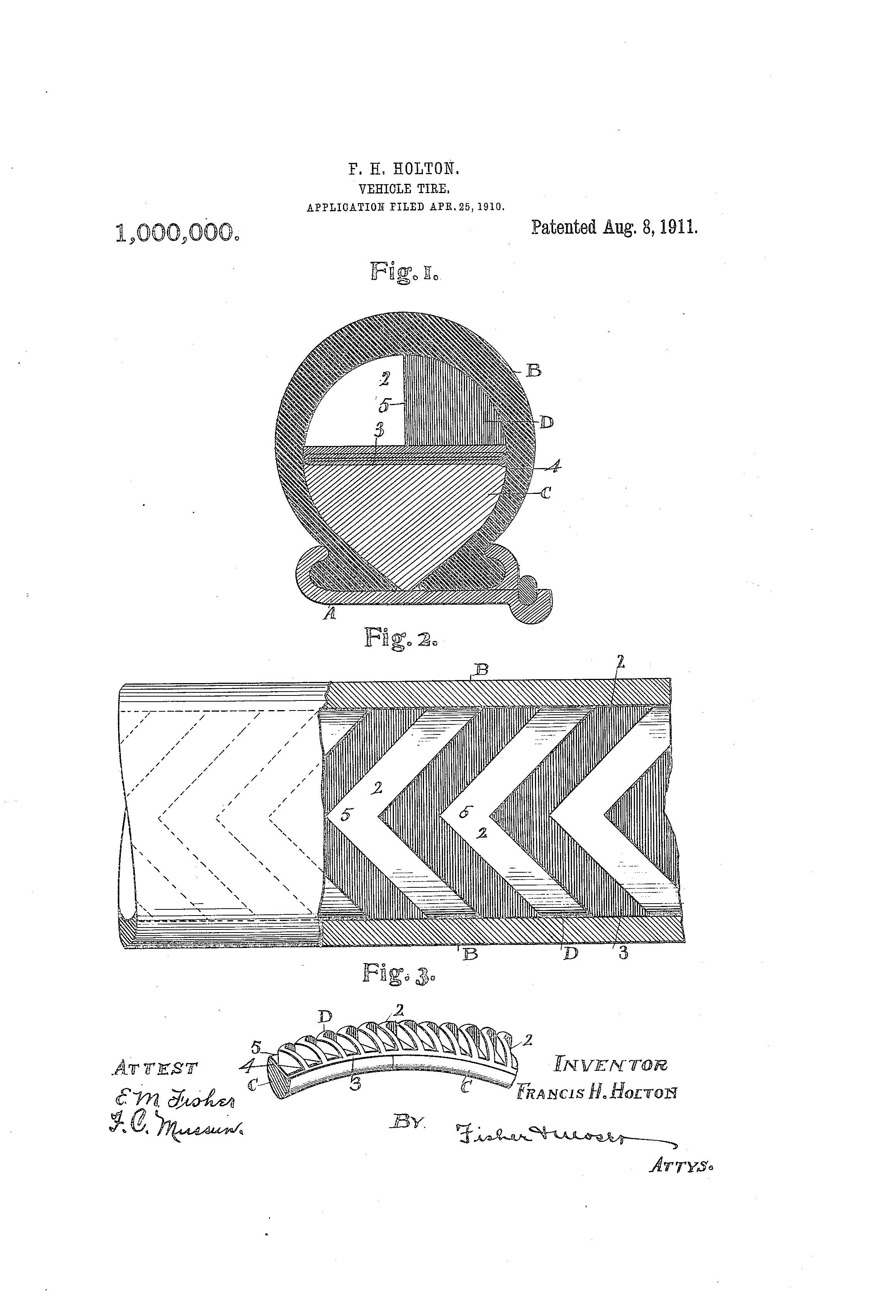
Patent of the Day: Cursor Control Device for Use With Display Systems
Suiter Swantz IP takes a look back at past inventions and inventors with our Patent of the Day.
On this day in 1984, William F. Lapson and William D. Atkinson of Apple Computer, Inc. was granted U.S. Patent No. 4,464,652 for a CURSOR CONTROL DEVICE FOR USE WITH DISPLAY SYSTEMS.
An excerpt from the patent states:
A cursor control device having particular application to a computer display system is disclosed. The cursor control includes a unitary frame, having a domed portion substantially surrounding and retaining a ball which is free to rotate. X-Y position indicating means are provided, such that rotation of the ball provides signals indicative of X-Y positions of the display system. The ball is free to "float" in the vertical direction within the dome, and thereby maintain good surface contact. X-Y positions are established by movement of the control device over a surface. A display system and method is disclosed for use in conjunction with cursor control device, which permits a user to select command options simply by movement of the displayed cursor over a "pull-down" menu bar.
Suiter Swantz IP is a full-service intellectual property law firm, based in Omaha, NE, serving all of Nebraska, Iowa and South Dakota. If you have any intellectual property questions or need assistance with any patent, trademark or copyright matters and would like to speak to one of our patent attorneys please feel free to contact us.
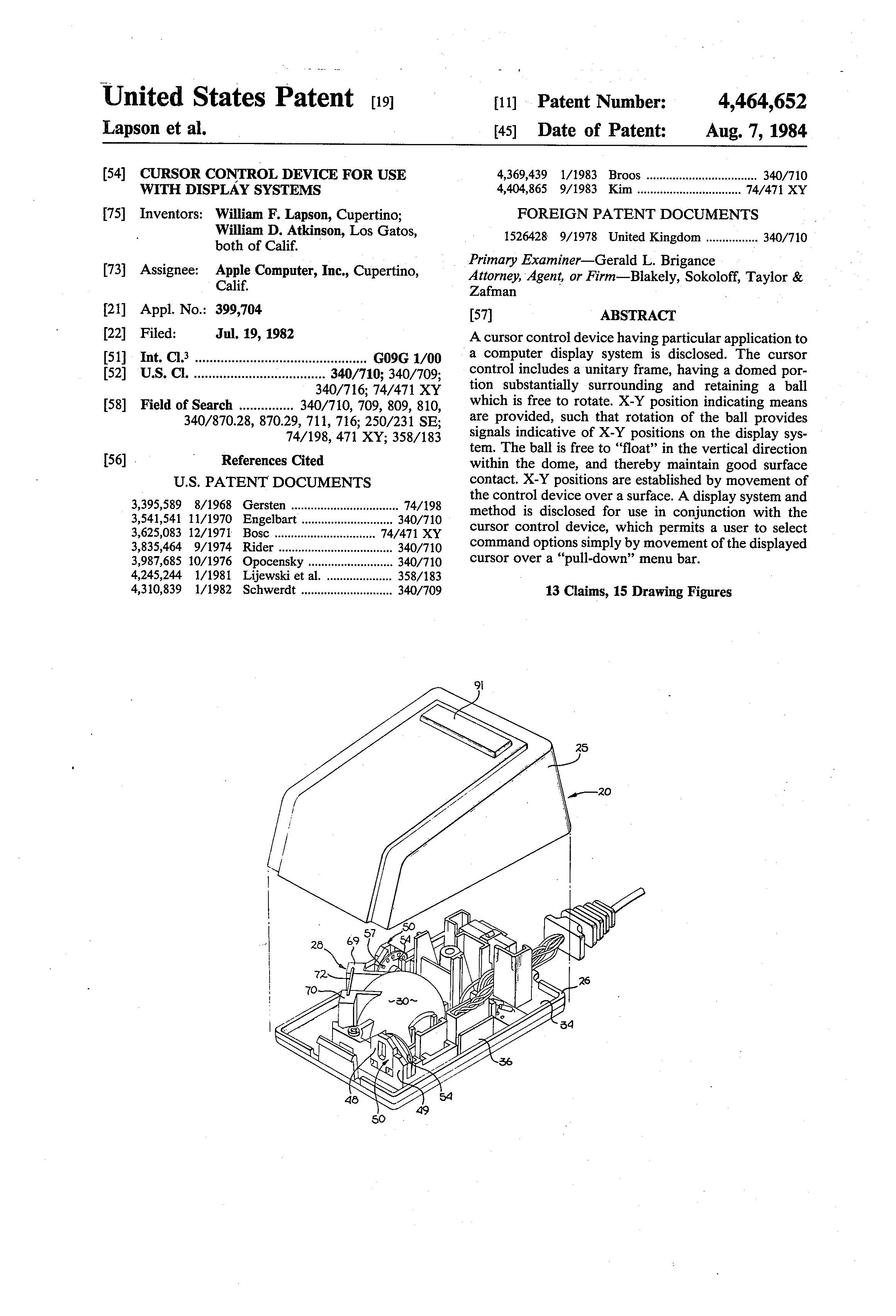
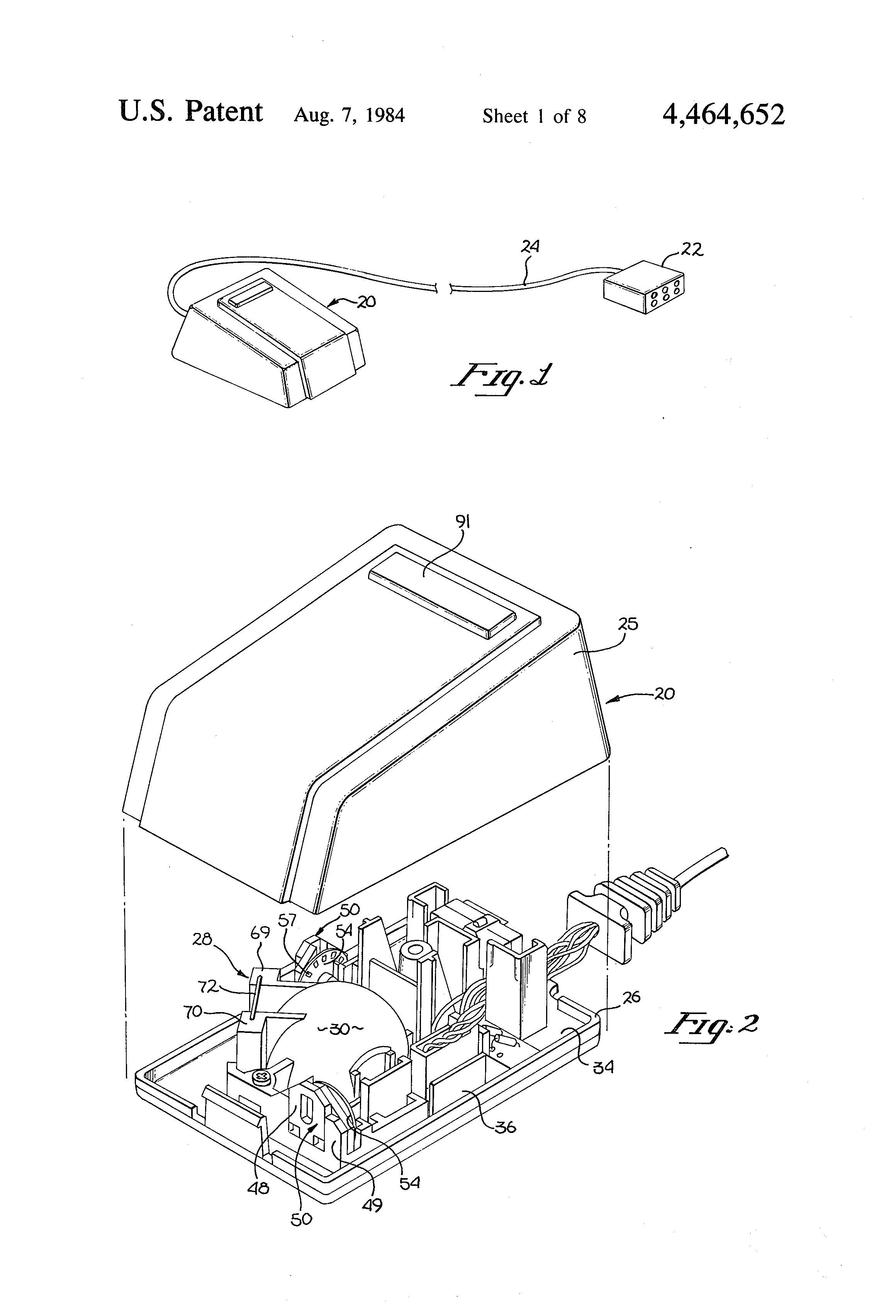
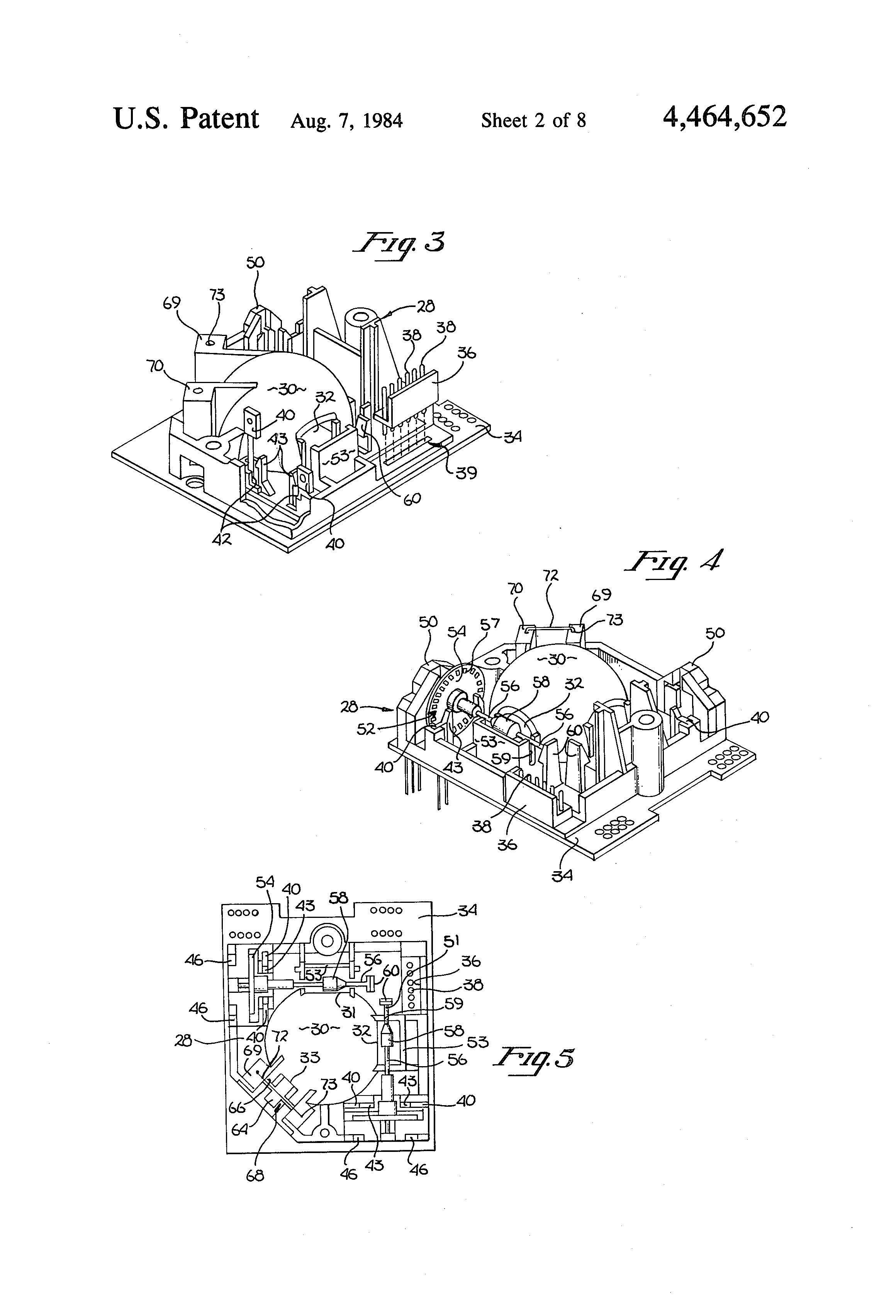
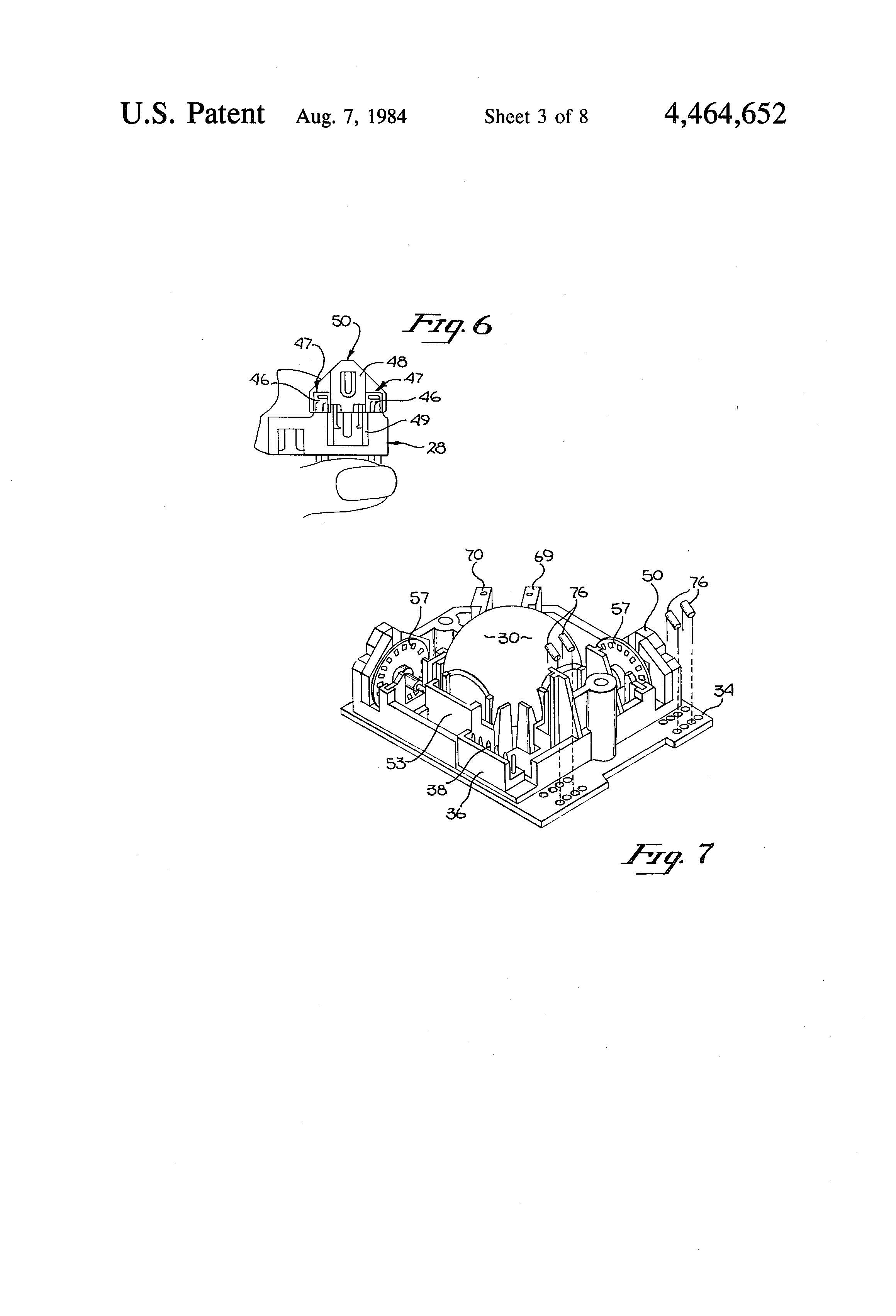
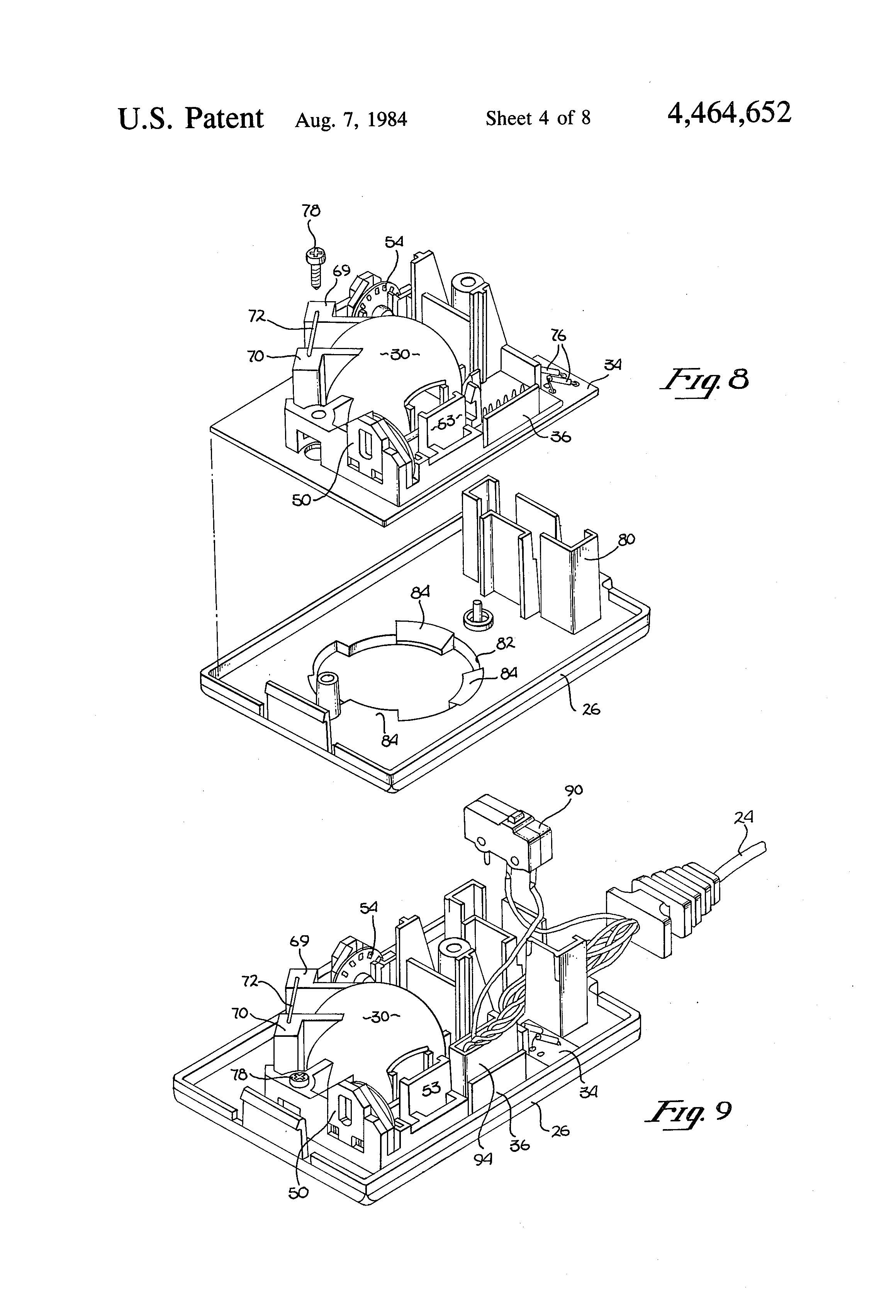
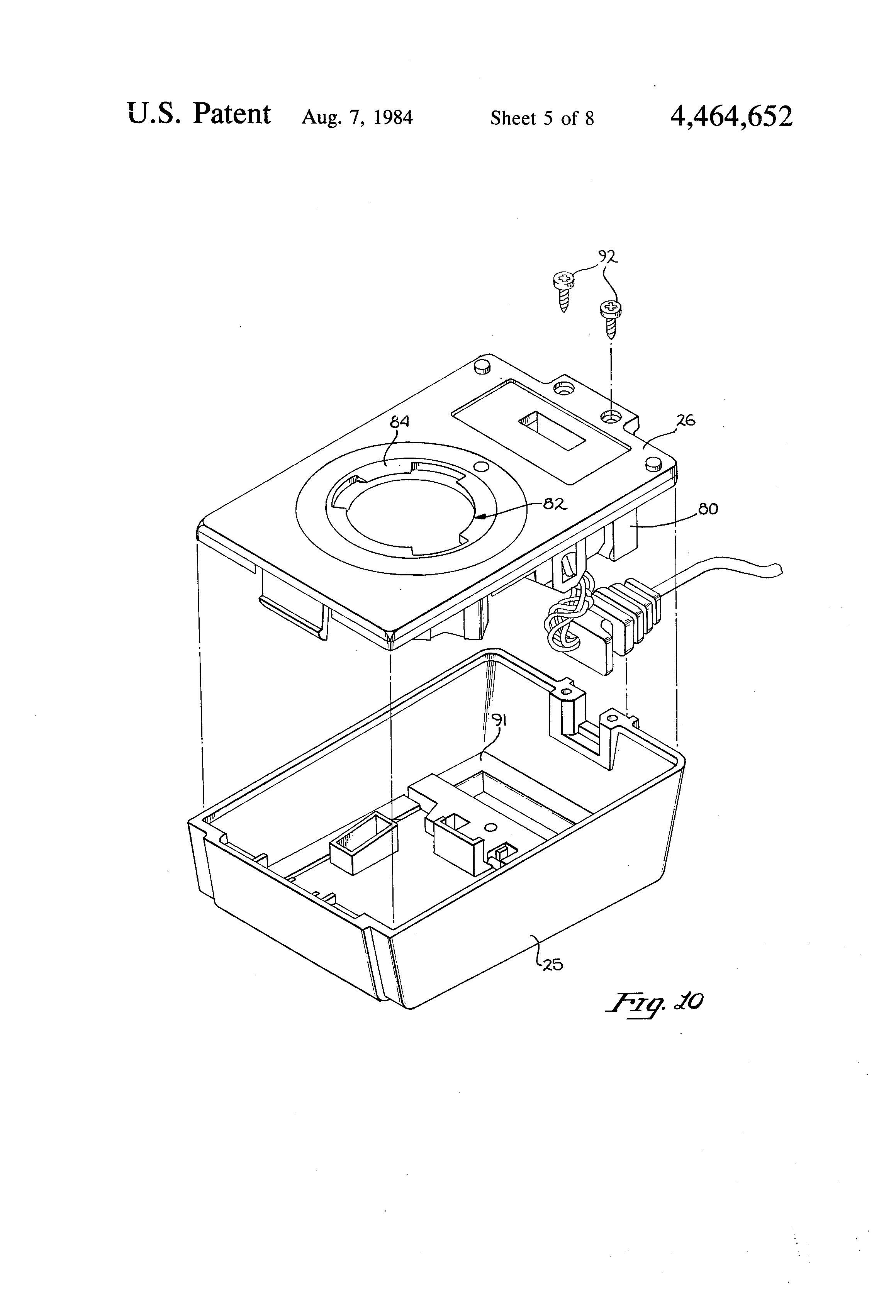
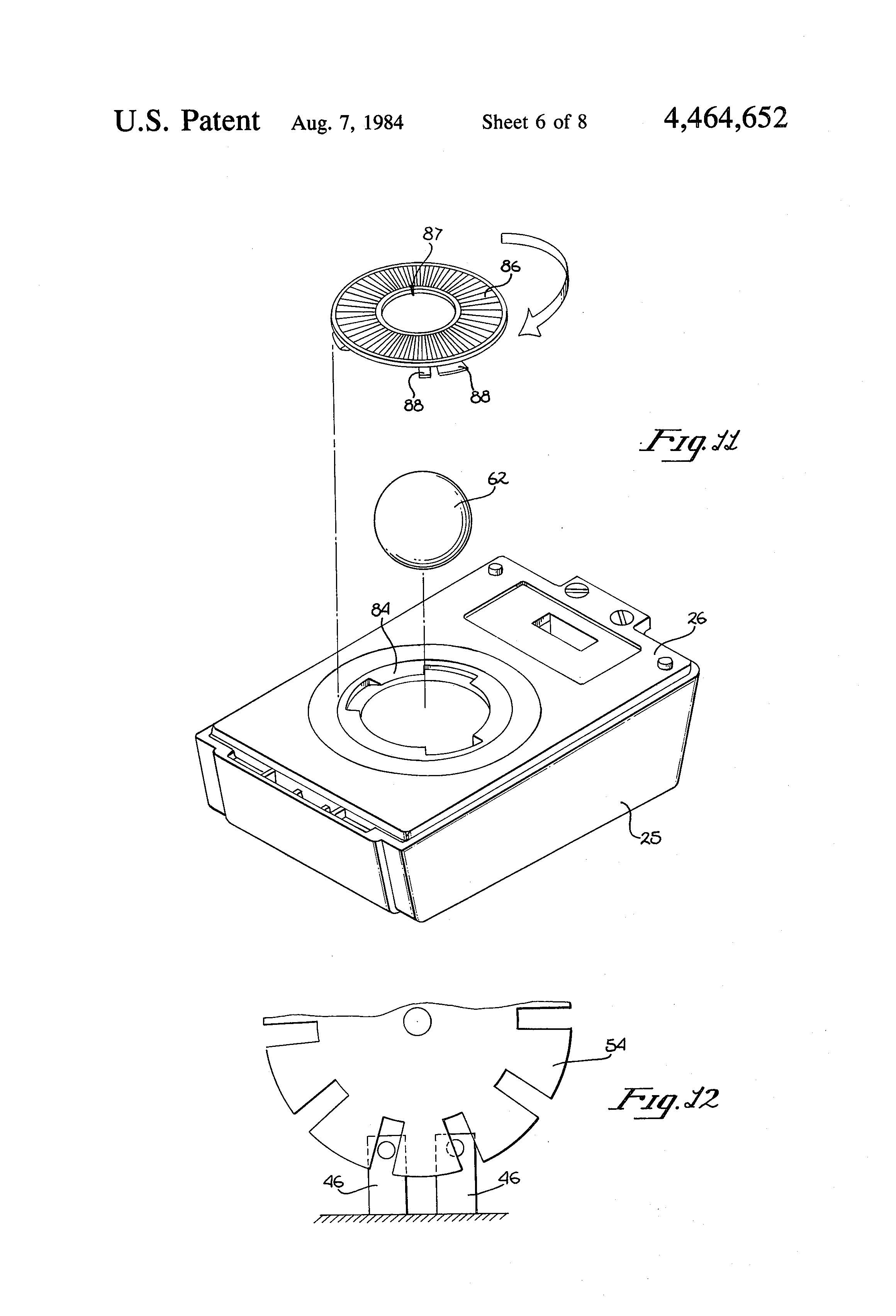
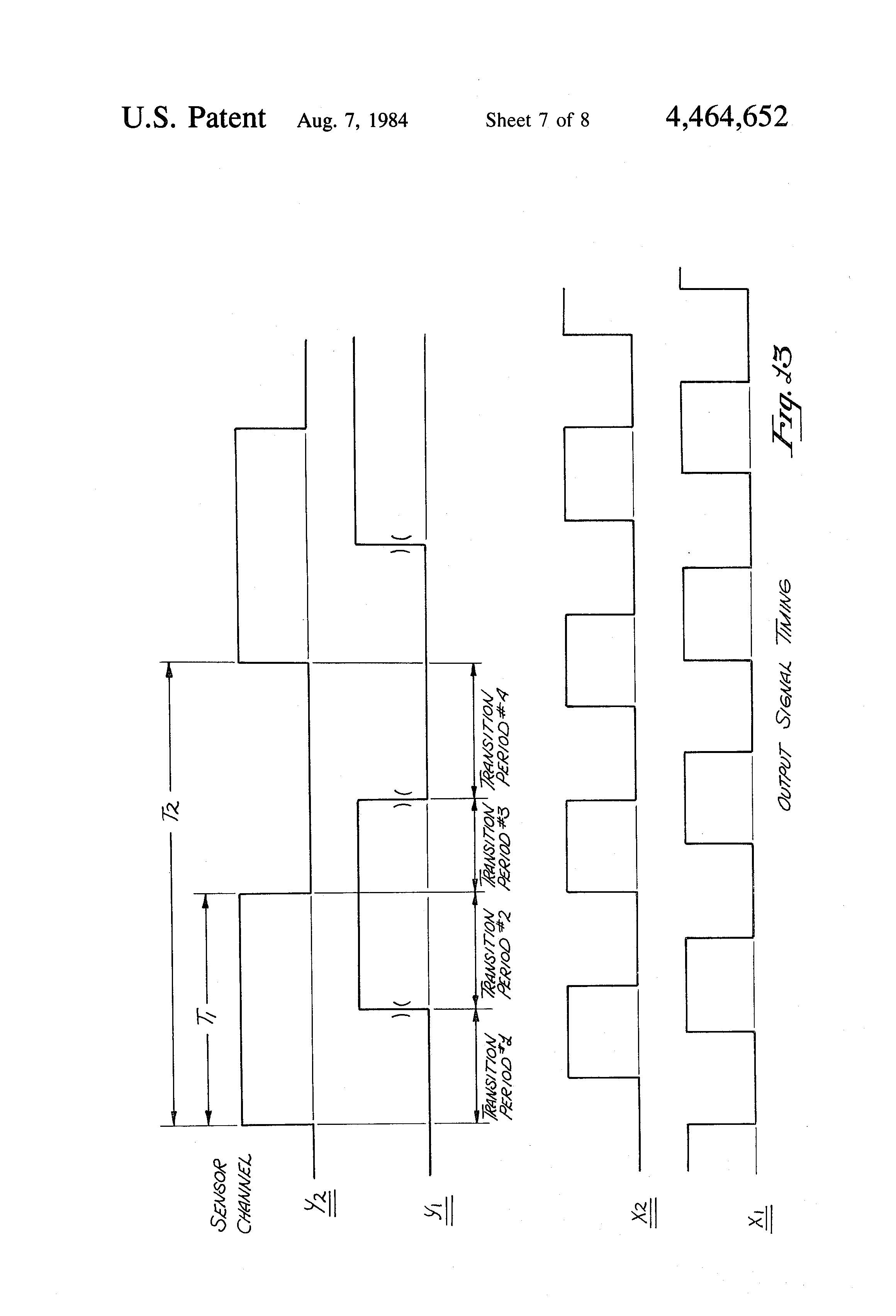
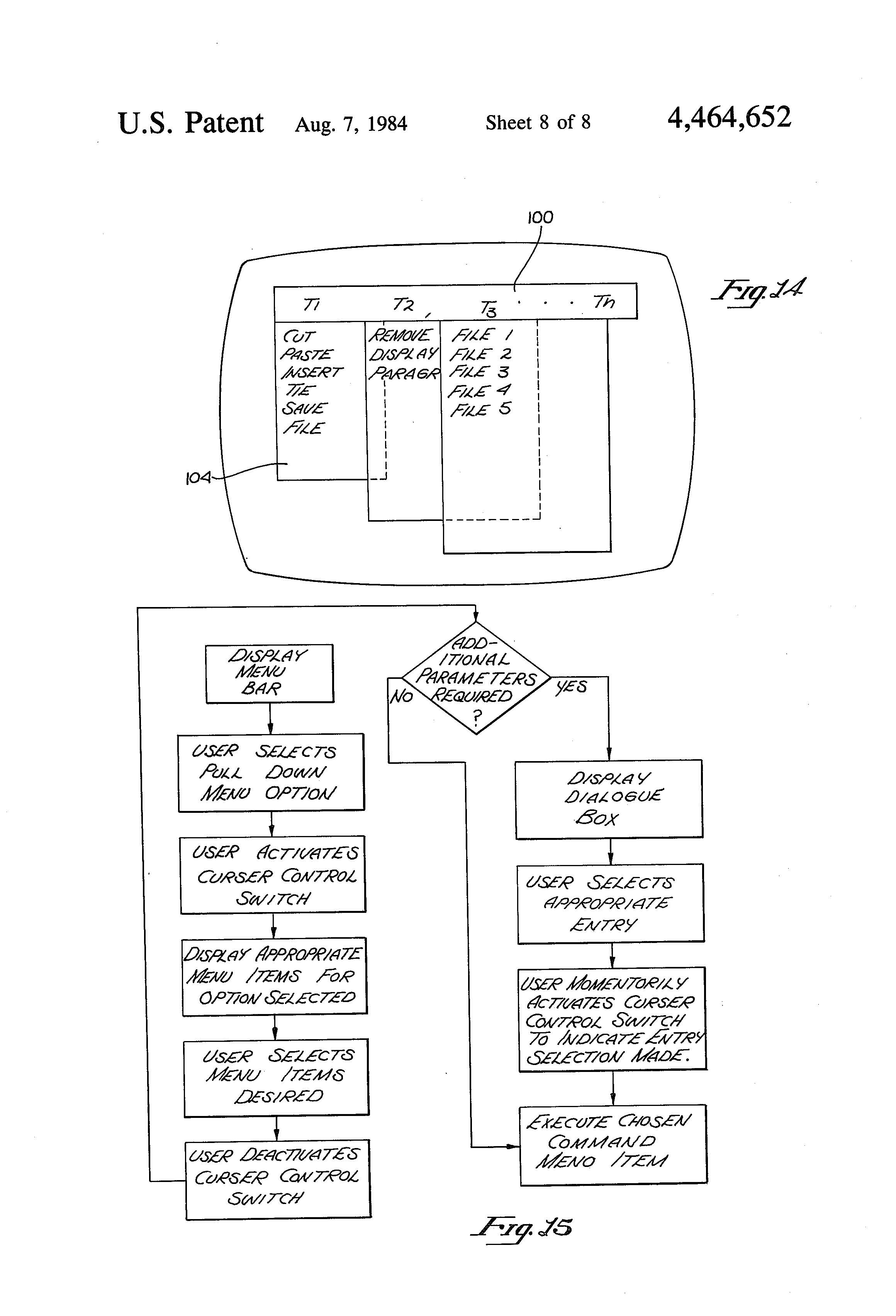
Patent of the Day: Egg Whipper
Suiter Swantz IP takes a look back at past inventions and inventors with our Patent of the Day.
On this day in 1896, George T. Cook was granted U.S. Patent No. 565,260 for a EGG WHIPPER.
An excerpt from the patent states:
An egg and cake whipper has heretofore been formed of a series of bows with a different construction of handle in which the bows were made rigid with the handle at the point of union. By my improvements the implement can be cheaply made without the use of solder. It is very durable and efficient, while at the same time the bows are yielding and elastic to better accommodate themselves to the blows of the user and to make them fit more closely to the walls of the pail, bowl, or other vessel in which the material is placed to be whipped or mixed.
When the bows are made rigid with the handle, they cannot yield except in the bows themselves, and when struck with much force they are liable to strain the wire at its junction with the handle, so that they often break off at that point. If the wires are soldered, the acid has a tendency to weaken the wires and increase this tendency to break where the strain is brought to bear. When the wires are loosely connected, as in my construction, the bows may yield by the twisting or torsional strain of the wire shanks as well as by the elasticity of the bows themselves, and the wire shanks may even twist or turn in the outer flange of the handle-core. This not only relieves the wires from strain at any one particular point, so that they are not liable to break off by repeated strains, but the bows may twist and turn so as to flat down and hug closely the walls of the pail or bowl, and as soon as the pressure is released they will resume their normal position. The wire shanks also form the grasping-surface of the handle and give the user a yielding, pleasant, and efficient hold.
I wish it distinctly understood that I do not limit myself to the precise details of construction, but desire to cover equivalents and such mechanical changes as may fairly fall within the spirit and scope of my invention.
Suiter Swantz IP is a full-service intellectual property law firm, based in Omaha, NE, serving all of Nebraska, Iowa and South Dakota. If you have any intellectual property questions or need assistance with any patent, trademark or copyright matters and would like to speak to one of our patent attorneys please feel free to contact us.
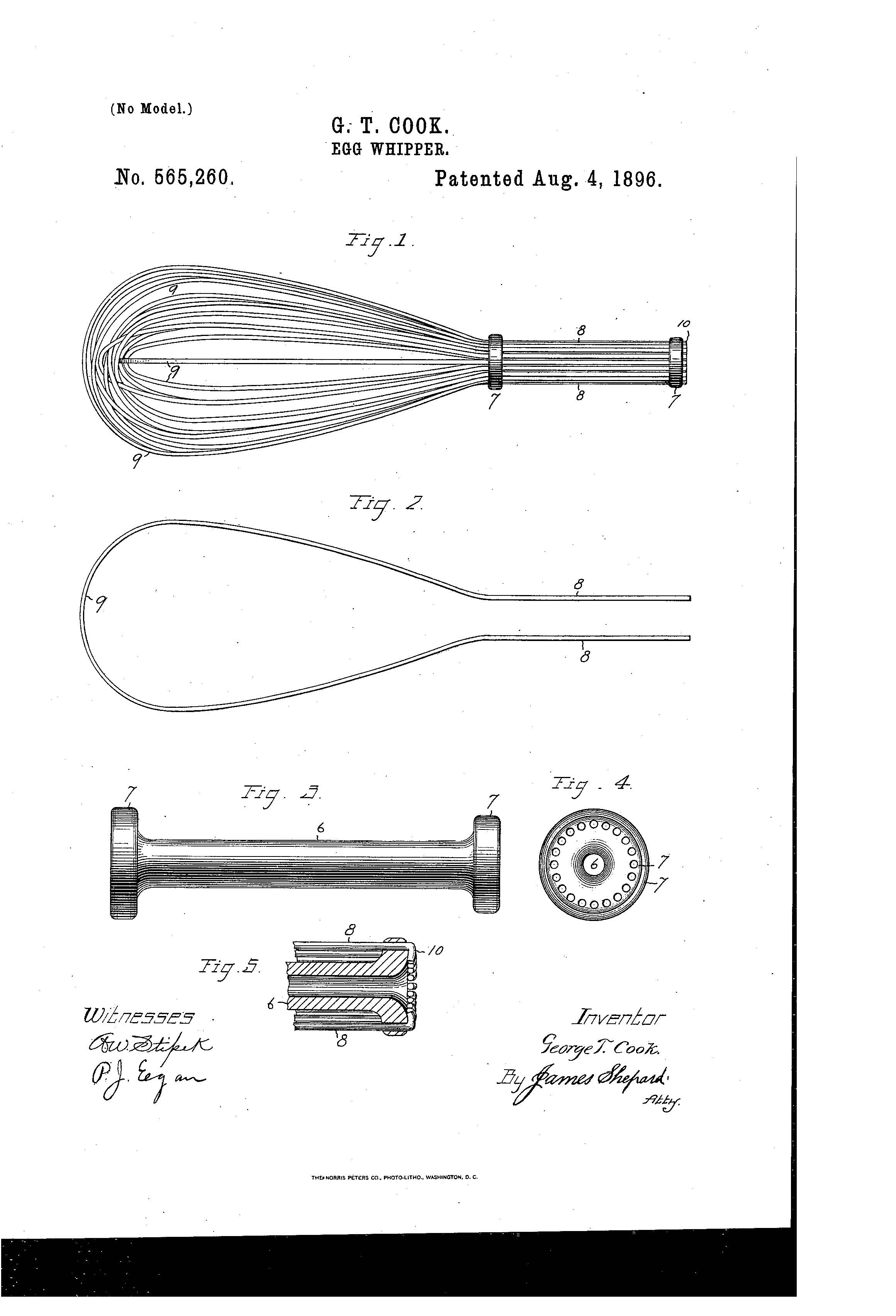
Patent of the Day: Mustatche Curler
Suiter Swantz IP takes a look back at past inventions and inventors with our Patent of the Day.
On this day in 1886, Joseph B. Sultzer was granted U.S. Patent No. 346,831 for a MUSTACHE CURLER.
An excerpt from the patent states:
Be it known that I, Joseph B. Sultzer, a citizen of the United States, residing at New York, in the county of New York and state of New York, have invented new and useful improvements in Mustache-Curlers, of which the following is a specification.
This invention has for its object to provide a novel device for curling mustaches; and it consists of a plate having a recess, combined with a brush, or, what I consider its equivalent, a comb capable of turning upon or adjacent to one face of the plate, in such manner that when the end of the mustache is passed through the recess of the plate and the brush is turned the desired curl is imparted to the mustache.
Suiter Swantz IP is a full-service intellectual property law firm, based in Omaha, NE, serving all of Nebraska, Iowa and South Dakota. If you have any intellectual property questions or need assistance with any patent, trademark or copyright matters and would like to speak to one of our patent attorneys please feel free to contact us.
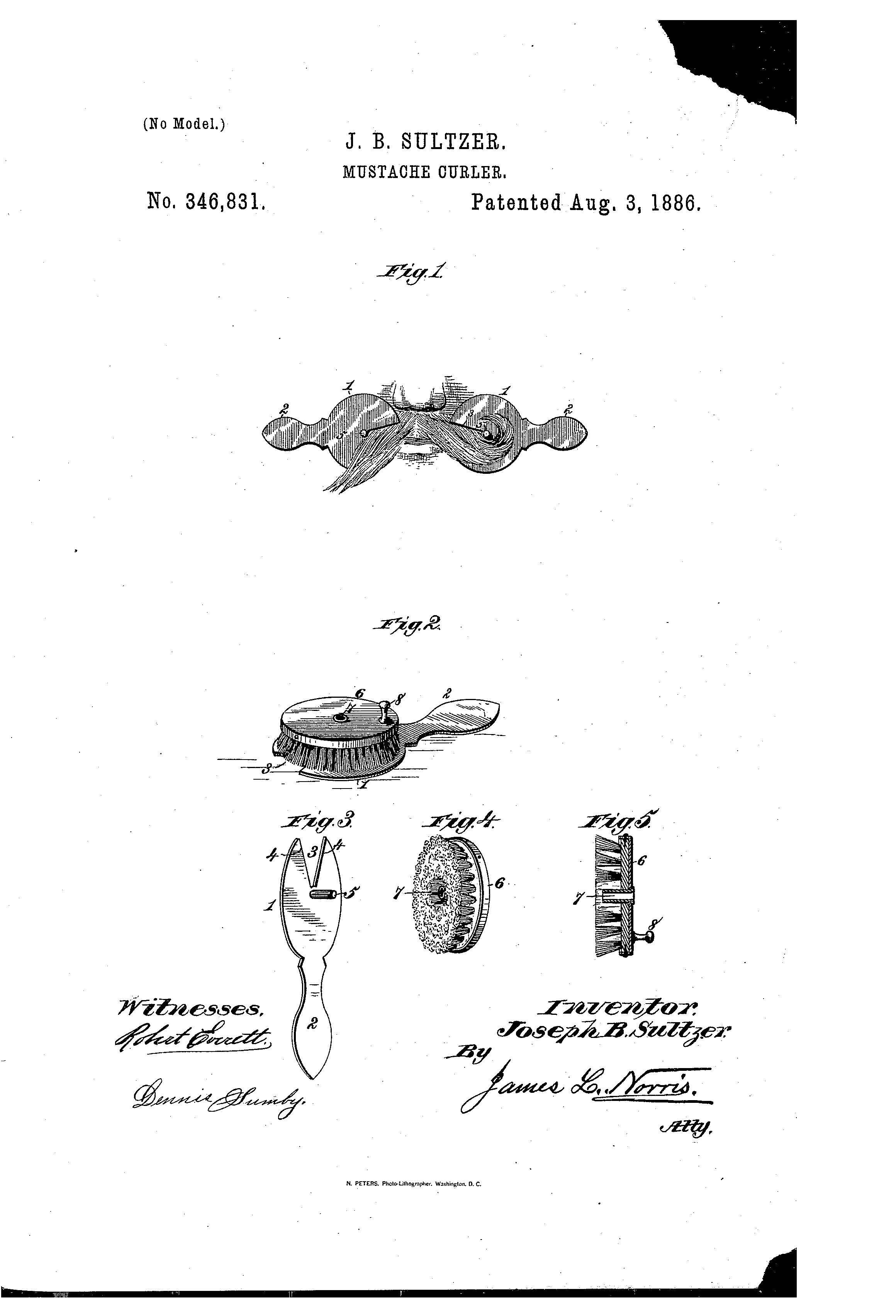
Patent of the Day: Diamond Synthesis
Suiter Swantz IP takes a look back at past inventions and inventors with our Patent of the Day.
On this day in 1960, Howard Tracy Hall was granted U.S. Patent No. 2,947,608 for DIAMOND SYTHESIS.
An excerpt from the patent states:
This invention relates to a method for converting non-diamond carbon into diamond and has for its principal object the provision of a method for converting non-diamond carbon into diamond which eliminates the need for determining the temperature at which the conversion takes place and which provides a positive indication of the time at which the conversion takes place.
These and other objects of my invention are accomplished by subjecting a mixture of non-diamond carbon and a suitable catalyst to a pressure of at least 75,000 atmospheres and applying sufficient heat to said mixture for a sufficient length of time to cause an inflection in the electrical resistance of said mixture. Inflection in electrical resistance as used in this application refers to a marked change i the rate of change of electrical resistance.
Suiter Swantz IP is a full-service intellectual property law firm, based in Omaha, NE, serving all of Nebraska, Iowa and South Dakota. If you have any intellectual property questions or need assistance with any patent, trademark or copyright matters and would like to speak to one of our patent attorneys please feel free to contact us.

